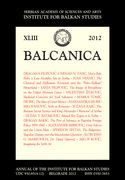Serbs in Romania: Relationship between Ethnic and Religious Identity
Serbs in Romania: Relationship between Ethnic and Religious Identity
Author(s): Aleksandra Đurić-MilovanovićSubject(s): Anthropology
Published by: Balkanološki institut - Srpska akademija nauka i umetnosti
Keywords: Serbs in Romania; Serbian Orthodox Church; neo-Protestants; Baptists; ethnic and religious identity; assimilation
Summary/Abstract: The paper looks at the role of religion in the ethnic identity of the Serbs in Romania, based on the fieldwork conducted in August 2010 among the Serbian communities in the Danube Gorge (Rom. Clisura Dunării; loc. Ser. Banatska klisura), western Romania. A historical perspective being necessary in studying and understanding the complexities of identity structures, the paper offers a brief historical overview of the Serbian community in Romania. Serbs have been living in the Banat since medieval times, their oldest settlements dating back to the fourteenth and fifteenth centuries. Today, they mostly live in western Romania (Timiş, Arad, Caraş-Severin and Mehedinţi counties), Timişoara being their cultural, political and religious centre. Over the last decades, the community has been numerically declining due to strong assimilation processes and demographic trends, as evidenced by successive census data (34,037 in 1977; 29,408 in 1992; 22,518 in 2002). The major-ity belong to the Serbian Orthodox Church (Diocese of Timişoara), but a number of neo-Protestant churches have appeared in the last decades. The research focuses on the role of the Orthodox religion among the Serbian minority in Romania and the role of new religious communities in relation to national identity. The role of the dominant Serbian Orthodox Church in preserving and strengthening ethnic identity is looked at, but also influences of other religious traditions which do not overlap with any particular ethnic group, such as neo-Protestantism. With regard to the supranational nature of neo-Protestantism, the aim of the study is to analyze the impact of these new religions on assimilation processes among the Serbs in Romania and to examine in what ways different religious communities influence either the strengthening or the weakening of Serbian ethnic identity. Keywords: Serbs in Romania, Serbian Orthodox
Journal: BALCANICA
- Issue Year: 2012
- Issue No: 43
- Page Range: 117-142
- Page Count: 26
- Language: English

